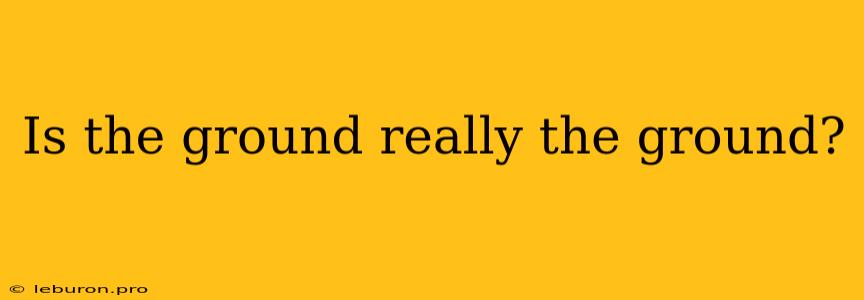The concept of "ground" seems simple enough. It's the solid surface beneath our feet, the foundation upon which we build our lives. But is it really as straightforward as it appears? The question, "Is the ground really the ground?" delves deeper, exploring the complex geological and philosophical layers beneath the surface we take for granted. To truly understand this question, we must journey into the depths of the Earth, examining the dynamic processes that shape our planet and the scientific and philosophical perspectives that challenge our perception of this seemingly stable foundation.
Beneath the Surface: A Journey Through the Earth
Our journey begins by exploring the layers beneath our feet. The ground, as we know it, is the Earth's crust, the outermost layer of our planet. It's composed of various rocks and minerals, constantly shifting and evolving. However, the crust is merely a thin veneer compared to the vast layers beneath it. The mantle, a thick layer of hot, semi-solid rock, lies below the crust. This layer is in constant motion, driven by convection currents that move heat from the Earth's core to the surface. These movements are responsible for plate tectonics, the driving force behind earthquakes, volcanoes, and the formation of mountains and ocean basins.
The Dynamic Nature of the Ground
The very foundation upon which we stand is a dynamic and ever-changing entity. The ground isn't static; it's a constantly evolving tapestry of geological processes. Earthquakes, volcanic eruptions, and erosion continually reshape the surface. Even the seemingly stable ground beneath our feet is subject to slow, imperceptible movements caused by plate tectonics.
The Philosophical Ground Beneath Our Feet
Beyond the geological reality of the ground, we encounter philosophical interpretations that further complicate our understanding. Philosophers have long pondered the nature of the ground, exploring its symbolic and metaphorical significance. The ground often represents stability, security, and a grounding force in our lives. It's a symbol of home, of the place where we feel rooted and connected.
The Ground as a Metaphor for Existence
The ground, in a metaphorical sense, can also represent the fundamental principles or foundations upon which we build our lives. Our values, beliefs, and experiences form the ground upon which we stand. This foundation, like the geological ground, can be shaken by external forces and internal struggles.
Unsettling the Ground: Challenging Assumptions
The question, "Is the ground really the ground?" pushes us to question our assumptions and explore the complexities beneath the surface. By understanding the dynamic processes that shape the Earth and the philosophical perspectives that influence our perception of the ground, we gain a deeper appreciation for the intricate and ever-evolving nature of the world around us.
The Unending Quest for Grounding
The quest for "grounding" is an ongoing process. Whether we seek grounding in a literal sense, finding a stable surface to stand upon, or in a metaphorical sense, seeking stability in our beliefs and values, the search for a solid foundation is a fundamental human need. However, as we've seen, the ground itself is not a static entity. It's a dynamic and ever-changing force, mirroring the complexities of our own lives.
The question, "Is the ground really the ground?" forces us to confront the limitations of our perceptions and embrace the constant flux of existence. It encourages us to look beyond the surface and explore the depths of our understanding, both of the world around us and of ourselves. Ultimately, the question itself is a journey, a quest for a deeper understanding of the ground beneath our feet and the ground within our hearts.
